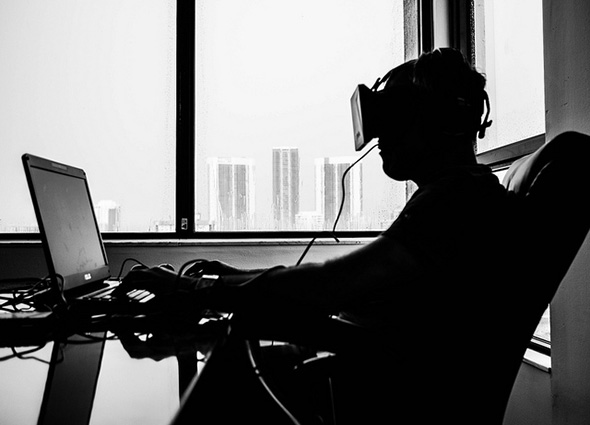Oculus CEO Says Facebook’s Disruptive Play For Rift Will Be The Virtual Classroom
It was two years ago this month that the original developer kit for the Oculus Rift blew past its $250,000 goal on Kickstarter en router to raking in nearly $2.5 million. The headline read, "Step into the Game" with the Oculus Rift being billed as "the first truly immersive virtual reality headset for video games." At the time, few could have predicted that it would be bought out by Facebook, but now that it has, what does the future hold? Will it be a bunch of 3D Candy Crush games? According to Oculus co-founder and CEO Brendan Iribe, the headset's future lies in the classroom.
"As we were marching along, we started to realize it was going to be a lot more important and have a lot more impact than just gaming. We believe this is going to be one of the most transformative platforms for education of all time. I know, it’s easy to say, hard to prove. But time will tell," Iribes told The Chronicle of Higher Education in an interview.
Iribes made his vision known while visiting the University of Maryland -- an institution he dropped out of and still owes money to for one of the 227 parking tickets he earned while attending the school -- to donate $31 million for a computer science building. Though he didn't finish out his college career, nobody can question the 35-year-old's success, nor his passion when you hear him talk about the Oculus VR.
His vision of the future includes Oculus VR technology squeezed into a pair of sunglasses. He imagines a day when 10 percent or 20 percent of the 130 million objects in the Smithsonian are scanned, and by putting on the VR shades, you're able to look around and see things clearly. But why stop there?

Iribes goes on to discuss the next step for VR technology, which is to have a shared space. You'd look around and see other people just as you do in the real world. You'd be able to look others in the eyes and stare at or manipulate the same virtual objects.
"And if we can make virtual reality every bit as good as real reality in terms of communications and the sense of shared presence with others, you can now educate people in virtual classrooms, you can now educate people with virtual objects, and we can all be in a classroom together [virtually], we can all be present, we can have relationships and communication that are just as good as the real classroom," Iribes says.
What do you think? Is the future of VR technology in the classroom, or is it best suited for gaming?
"As we were marching along, we started to realize it was going to be a lot more important and have a lot more impact than just gaming. We believe this is going to be one of the most transformative platforms for education of all time. I know, it’s easy to say, hard to prove. But time will tell," Iribes told The Chronicle of Higher Education in an interview.
Iribes made his vision known while visiting the University of Maryland -- an institution he dropped out of and still owes money to for one of the 227 parking tickets he earned while attending the school -- to donate $31 million for a computer science building. Though he didn't finish out his college career, nobody can question the 35-year-old's success, nor his passion when you hear him talk about the Oculus VR.
His vision of the future includes Oculus VR technology squeezed into a pair of sunglasses. He imagines a day when 10 percent or 20 percent of the 130 million objects in the Smithsonian are scanned, and by putting on the VR shades, you're able to look around and see things clearly. But why stop there?

Iribes goes on to discuss the next step for VR technology, which is to have a shared space. You'd look around and see other people just as you do in the real world. You'd be able to look others in the eyes and stare at or manipulate the same virtual objects.
"And if we can make virtual reality every bit as good as real reality in terms of communications and the sense of shared presence with others, you can now educate people in virtual classrooms, you can now educate people with virtual objects, and we can all be in a classroom together [virtually], we can all be present, we can have relationships and communication that are just as good as the real classroom," Iribes says.
What do you think? Is the future of VR technology in the classroom, or is it best suited for gaming?


